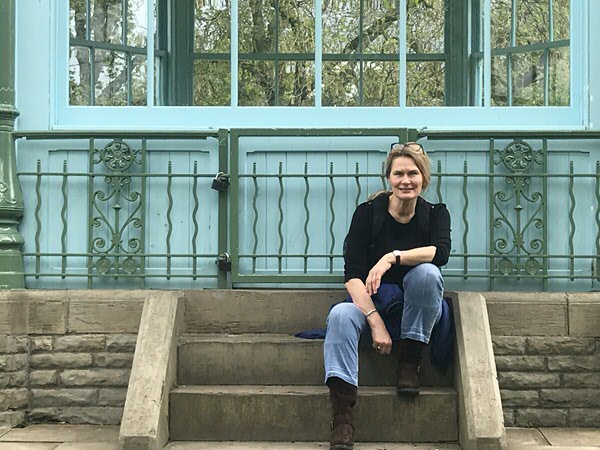‘I sometimes feel like an economic migrant.’
Henriette Louwerse (57) had just graduated and started a summer job as a flight attendant when she received a letter from the job centre: the University of Sheffield was looking for a Dutch teacher. And so it was that the new graduate of English arrived in the former British steel city in September 1990. She never left, and now heads a large department in Dutch Studies.
Text: Ellis Ellenbroek; Source: Broerstraat 5; www.sheffield.ac.uk/dutch
Henriette lives in a stone house near a former quarry, with a pre-war cooker in the kitchen, a sumptuous garden and even a tree inside the house. ‘Think James Herriot,’ she says, referring to the vet and writer whose adventures were televised in a series. Sheffield, located in the Peak District National Park in the county of South Yorkshire, is green and hilly, and all traces of the WWII bombings have been eliminated. However, there is another side to Sheffield, which is the roughness of the industrial past. It was this side that guest writer Abdelkader Benali recorded, having visited Sheffield for the European project Citybooks, which asked writers and photographers to capture cities in words and images. The author described the debauchery and the vulgarity to be seen in the pubs and clubs of the city, and Henriette remembers the dismay expressed at the university that Sheffield had been shown in such a light. However, she recognized a lot of what Benali had to say.

From a modest elective course unit when she first arrived in Sheffield, Dutch has grown into a main course unit with as many as 80 students. Henriette is also President of the Internationale Vereniging voor Neerlandistiek (International Association for Dutch Studies), and received a Royal decoration for her efforts to promote the Dutch language abroad.
According to Henriette, the Dutch look down on their language. ‘Our export products are the 17th century, famous painters, Dutch design and our footballers. But we seem to have a huge blind spot when it comes to our language.’ There’s no need for this, she says: ‘It’s a very interesting language, it represents an economically and culturally strong region, covers the Netherlands, Belgium and Suriname and is related to Afrikaans.’
Henriette’s brother and sister also live in the United Kingdom. Her father was an anglophile: ‘He studied in Edinburgh for a year, we had calendars of the Scottish Highlands at home and the BBC was always playing on the TV. You could say we were indoctrinated.’
Even so, Henriette has thought a lot about returning to the Netherlands recently, due to Brexit. ‘It really makes me sad. For a long time, I thought that I belonged here, as a fellow European. But I was wrong, and I even feel like an economic migrant sometimes, who has to prove that they have the right to live here.’
Together with her husband and three children, she makes lists about what they still like about the United Kingdom. Thankfully, the list is still quite long. It includes spontaneity, for example, as seen – believes Henriette – in the ease with which the Brits got on with the Covid-19 vaccinations: ‘In the Netherlands, everything needs to be registered, whereas here it is much less bureaucratic: Have you got an arm? OK, let’s get that jab in.’
Henriette also praises the generosity of the British when a foreigner makes the effort to speak English. ‘A Brit who has learned Dutch still makes mistakes with ‘de’ or ‘het’, or the word order. When they do, the Dutch say: “Hmmmm, that’s not quite right,” or “What a strange accent.” You’ll never hear a Brit say that, as they would find it terribly rude. If you speak their language, a Brit will say: “How wonderful! Sounds great!”’
Listen to Abdelkader Benali talk about Sheffield and to other city stories on www.citybooks.eu.
More news
-
15 September 2025
Successful visit to the UG by Rector of Institut Teknologi Bandung
